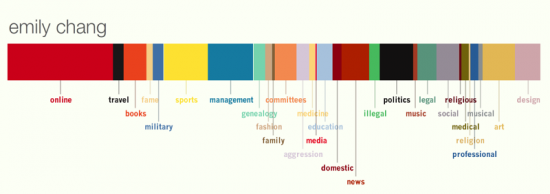Personas: Portrait of Your Data Identity

Personas is a new project by the Sociable Media Group from MIT Media Lab and is currently showing at the MIT Museum and online.
It uses sophisticated natural language processing (PDF link) and the Internet to create a data portrait of one’s aggregated online identity. In short, Personas shows you how the Internet sees you.
To create a portrait, you simply enter your name and the site searches the web for content related to you. The visualization of this search process is well-designed, but it’s also frustrating to see articles come up that you know aren’t related to you. For example, if I enter “Emily Chang” I see posts and content about me, but also content about other Emily Changs, most notably, the CNN reporter by the same name.
The project creators acknowledge this in the description of their philosophy, saying:
In a world where fortunes are sought through data-mining vast information repositories, the computer is our indispensable but far from infallible assistant. Personas demonstrates the computer’s uncanny insights and its inadvertent errors, such as the mischaracterizations caused by the inability to separate data from multiple owners of the same name. It is meant for the viewer to reflect on our current and future world, where digital histories are as important if not more important than oral histories, and computational methods of condensing our digital traces are opaque and socially ignorant.
True, but it would have been a fun interaction to be able to just click “not relevant” on those mischaracterizations, and fascinating to see a more relevant portrait of oneself. I tend to think my persona snapshot (shown above) would not have such high weights for “military, sports, genealogy, committees, medicine, aggression, domestic, illegal, religious, or medical.”
Try your own online data portrait at Personas.
[Via coolhunting]

1 Comment
Join the discussion and tell us your opinion.
I resonate with your comment ” True, but it would have been a fun interaction to be able to just click “not relevant” on those mischaracterizations, and fascinating to see a more relevant portrait of oneself.”
The concept is pretty cool, but the above is needed. We tried something along the above lines at Arktan to auto-find a user’s content. To get around false-positives we allow users to choose what belongs to them and what doesn’t.